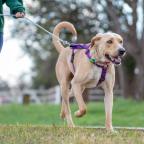
New report reveals UK's happiest places to be a dog
For dogs, a happy place can be somewhere physical, like cuddling up next to their owner on the sofa, dozing by the fire or rolling around in a muddy puddle. But it can also be a feeling, like the excitement of a new toy, the comfort of being with their favourite humans, or the relief of just being somewhere safe.
To examine the various factors that contribute to a dog's satisfaction, an academic has developed a new formula – the Canine Happiness Score (CHS).
The new scoring system has been devised by Mark Rowlands, Professor of Philosophy at the University of Miami. Mark holds a PhD from Oxford University and is the author of many books, including The Happiness of Dogs – in which he argues that a dog's capacity for joy far exceeds that of humans.
In order to apply scores to regions and cities across the nation, Dogs Trust – the UK’s largest dog welfare charity – surveyed 5,002 UK dog owners, with the findings analysed and reviewed by Rowlands, and published in a new report: The Happy Place Index.
Respondents were asked specific questions that related to three types of ‘good’:
-
Animal Goods (A) capture the physical wellbeing of dogs – the basic necessities for a dog’s survival, such as food, water, shelter and healthcare.
-
Social Goods (S) are the aspects of dog ownership that may be measured indirectly – quality time, security and companionship.
-
Finally, Individual Goods (I) reveal the emotional core of canine happiness that can vary from one dog to another – the depth of understanding, communication and mental stimulation that defines the bond between individual dogs and their owners. Different dogs will be stimulated by the different things they are interested in.
To work out the CHS for each location, Rowlands added together 0.4A + 0.4S + 0.2I, with the weighting reflecting the fact that individual goods are more difficult to assess than animal and social goods, and also not entirely separable from the other goods – in this, satisfying animal and social goods will go some way toward satisfying individual goods. The full list of questions and scores can be found in the Index.
With number-crunching complete, the report reveals that Plymouth, Liverpool and Belfast top the leaderboard for canine happiness.
All cities and regions surveyed scored above the halfway mark, demonstrating a clear pattern of excellent canine care. But while dog owners everywhere are performing well, there’s more that can be done to improve happiness scores across the nation.
When it comes to Animal Goods, London leads the charge with an impressive score of 8.65 out of ten, with the West Midlands and South West following closely behind. Zooming into cities, Brighton & Hove nudges itself ahead of London, while Exeter takes third place.
With a difference of just 0.53 separating first from last, dogs across the UK are clearly well-cared for. Gen Z and Millennials set an excellent example for strong Animal Goods, as 70% of the former and 66% of the latter take their dogs to the vet for a routine check-up every six months – a stat which rises to 85% for dog owners of Black, Black British, Caribbean or African descent.
Almost three quarters of owners (72%) agree that they take more steps to support their dog’s general health than their own – 34% strongly agree.
Turning to Social Goods, numbers drop slightly with the top scorer Northern Ireland achieving 5.79 out of ten – the North West and Scotland follow. Matching Northern Ireland’s score, Liverpool comes out on top of cities with Plymouth taking second and Belfast third.
High-ranking areas in this category earned points just for having fun! Over half (57%) say they bring their dog along to meet-ups with family and friends, while 45% make an effort to visit dog-friendly pubs – for those pups happy to be included in social visits. Heartwarmingly, over two thirds (67%) confess they have cancelled plans simply because they preferred to stay at home in the company of their dog – an excuse you can’t help but respect.
However, as a nation, we score particularly low for social goods due to the length of time we leave our dogs alone in a single period. The national average of five hours currently exceeds Dogs Trust’s recommended maximum of four, but with some small adjustments to reduce time spent alone, every region in the UK could increase their Social Goods score – an increase which could see the overall leaderboard shift significantly.
As an example, East Anglia and Cambridge both score lower on the Social Goods leaderboard.
Whilst owners in these areas care deeply about their dogs – as evidenced by the 39% of East Anglians and 38% of Cambridge residents likening their dog to their child – these areas fall down the social rankings particularly for walking their dog less during winter months (50% East Anglia, 53% Cambridge) and leaving their dog alone for more than the recommended four hours.
Professor Mark Rowlands advises: "These areas – and indeed others – can easily increase their Social Goods. Taking the time to ensure our dogs are left alone for that little bit less, and trying to ensure walking consistency all year round can pay dividends for our four-legged friends".
Individual Goods herald the most impressive scores. This type of good is well-accounted for by London, which scores 9.64 out of ten. The South East comes in second with 9.61, whilst the West Midlands scores 9.59. When it comes to cities, our top scorers are Norwich (8.19), Edinburgh (8.12), and Exeter (8). This is really great news – across the UK, owners are prioritising their pets, and 97% say they’re an integral part of the family.
The research shows that over half (53%) of owners provide mental stimulation or enrichment for their dogs at least once a day. 29% do so multiple times, every day, rising to 44% of Baby Boomers.
Rowlands continues: “If you give dogs the raw materials for happiness, they will typically do much more with them than we will. This ability to ‘make the most of things’ is something from which we can all learn.
More often than not, we follow a similar routine to our dogs. We eat, sleep, rest and repeat. However, if we’re not interacting with friends, family, or even strangers, we lose the joy and wonder that life has to offer. It’s the same for dogs. As much as they need their food and water, they also need an element of community and quality time doing what they love with people they love”.
Adding together Animal, Social and Individual scores, the overall highest scoring regions, Northern Ireland (7.55), the North West (7.54), and Scotland (7.53), are not necessarily the most affluent or urban, but are regions that seem to combine community, routine and outdoor access. With a little time and effort everyone on the leaderboard can increase their scores by taking inspiration from fellow dog owners.
The UK’s Happiest Cities for Dogs:
-
Plymouth (7.26/10)
-
Liverpool (7.21/10)
-
Belfast (7.2/10)
-
Southampton (7.12/10)
-
Birmingham (7.09/10)
-
Newcastle upon Tyne (7.06/10)
-
Norwich (7.06/10)
-
Edinburgh (7.04/10)
-
Exeter (7.02/10)
-
Glasgow (7.02/10)
Dr Rob Christley, PhD, Honorary Professor of Epidemiology & One Health at the University of Liverpool and Head of Research at Dogs Trust, comments, “It’s important to note that there always has to be a last place, but this does not equate to failure. In fact, all regions having a score of over 6/10 demonstrates the nation has an excellent understanding of what it means to provide a Happy Place for their dogs. With opportunity for improvement, we can all work together to rise up the ranks with no better incentive than even happier dogs”.
There’s no one size fits all when it comes to a dog’s Happy Place – it’s a spectrum. The Index demonstrates that achieving happiness isn't about excelling at one particular good, but rather showing up consistently across the board.
Our four-legged companions truly are man's best friend, and never fail to deliver new ways to make us smile. We can all do our bit to ensure we're giving our dogs a Happy Place in return – this festive season and forever.







